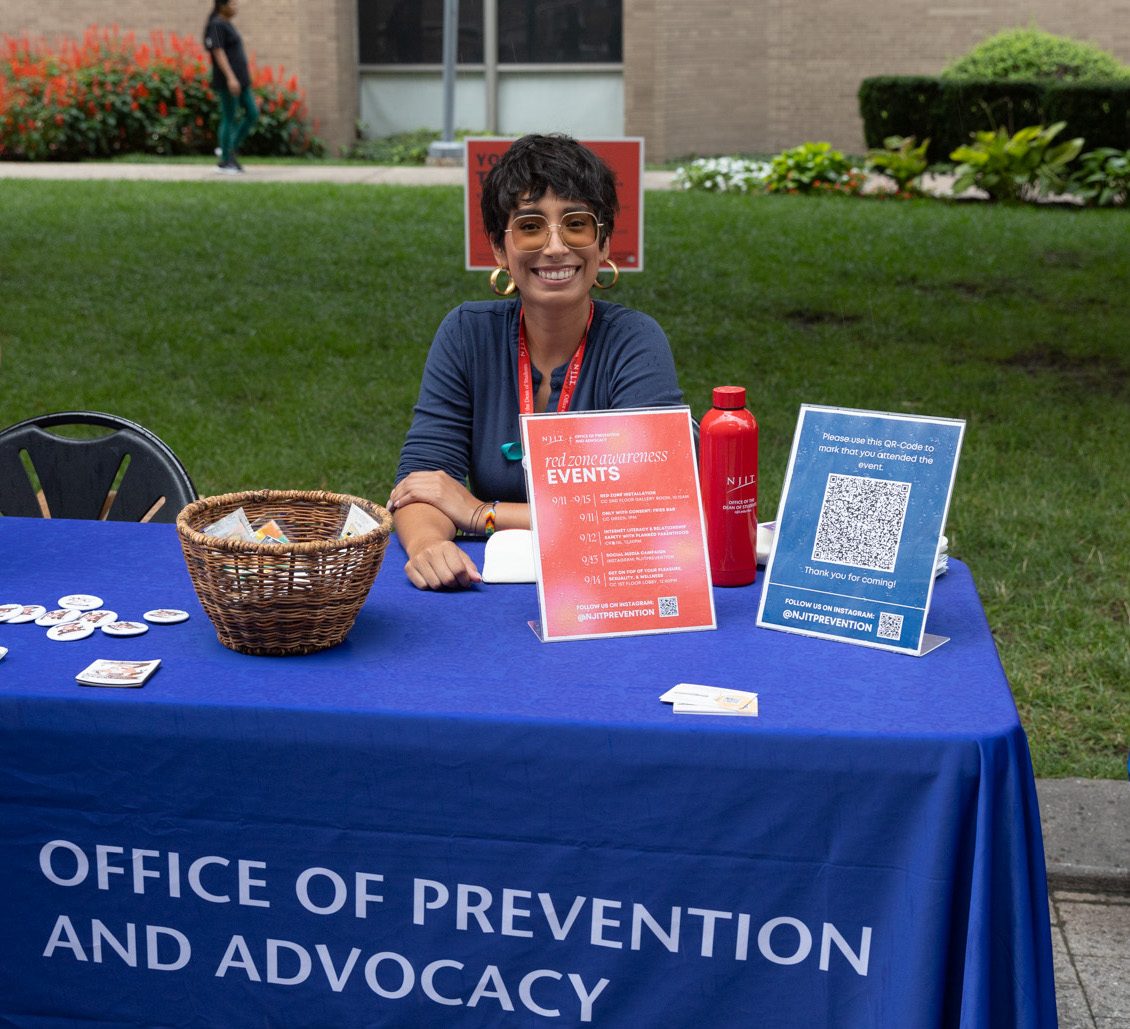About six months ago, Brittany Gaviria Sanchez joined NJIT as the university’s inaugural Prevention Specialist in the Office of Prevention and Advocacy, which was established this summer. The office falls under the umbrella of the Dean of Students, as does Title IX, but provides a distinct space that is more autonomous and confidential for students to voice any concerns surrounding dating and sexual violence.
“I noticed that other universities’ prevention is separate from Title IX — but they still work in tandem,” Gaviria Sanchez recalled telling Dr. Kristie Damell, Associate Dean of Students and Title IX Coordinator, as she joined the team. Damell encouraged her to continue benchmarking other colleges to write a mission statement, ultimately leading to the origin of the office.
“We have been shifting efforts from a process-oriented lens — which includes how and where to file a Title IX report — to a prevention perspective with heavier emphasis on outreach and education,” Damell said in an email interview. “Based on my responsibilities within the Dean of Students and Title IX, having another staff member was a priority. Deneen Scuderi, Director of Campus Health Services, [as well as Peggy Fleurmond, Assistant Director,] helped tremendously with this process.”
As the Title IX Coordinator, Damell is required to maintain neutrality to support all parties involved in a Title IX-related matter. Gaviria Sanchez, however, can work with survivors on another level; she is trained to share resources with any student who speaks with her to help them understand their options without having to report to Title IX. She also is able to gauge the culture at NJIT confidentially and provide the Office of the Dean of Students a better understanding of the challenges students face.
“I think sometimes hearing about Title IX can be really intense; it could scare students,” Gaviria Sanchez contemplated. “It gives me the opportunity to advocate for certain changes since I can see through certain gaps that other offices won’t be able to see because maybe some students don’t go to Title IX.”
One of her upcoming objectives is to enhance training for student leaders on campus, such as Resident Assistants and Teaching Assistants. They are assigned to be ‘mandated reporters’ when it comes to students under their jurisdictions alerting them about something that may have happened, but the leaders don’t always understand what that indicates. Gaviria Sanchez would like to make sure they are aware of how they can refer students with concerns to the appropriate people to address the matter effectively.
Engaging the campus community is a core part of how she believes she can reach students most successfully. While she has held events centered around presenting information to an audience, she finds that having casual but intimate conversations with others is more powerful.
“I like the idea of lunch-and-learns, where we’re just chatting and eating. I want to create trust — I want to create intimacy where these conversations are hard,” Gaviria Sanchez explained. “If I just present to students, it could feel very distant.”
She recently had the opportunity to hold such an event as a collaboration with other organizations on campus. While there was a small presentation attached to the program, she was able to bring in stories from her personal life and have other participants share some of theirs as well. More conversations were made as students started to understand the similarities and connections between their own contributions and others’.
The event brought about cultural nuance in the group from the participants’ respective backgrounds. “I know you might see me as an expert in the field [of dating and sexual violence], but I didn’t know about these things growing up, coming from a Latina perspective,” she remembers telling the attendees. “I grew up with this idea of, ‘This is just how things go,’ until I came into my own stage of learning that it might actually be a problem.”
Ultimately, Gaviria Sanchez wants this type of conversation to not feel stagnant at any point, whether that means she’s running an event, collaborating with other organizations, or posting on social media. Making herself known to the entire student body is a significant part of her role.
“I really want to stress to people that the office is called the Office of Prevention and Advocacy for a reason,” she said. “I’m not only someone you can talk to about what you experience — I’m also an advocate for all of you when I’m not directly speaking with you; I’m an advocate when I’m in other rooms with other campus professionals.”
Her biggest fear is that stagnant conversation will lead to students feeling alone and like they have nowhere to go; they might feel that their story doesn’t matter, or no one is willing to listen to it. “I want students to have agency; I think it’s important for them to know their Title IX rights,” Gaviria Sanchez emphasized. “I think it’s important for them to know that they are deserving to talk to someone confidentially about their trauma and experience, with no one judging them.”
While she is the only specialist in the office as of now, Damell mentioned that future plans include adding staff members to properly address the “growing student body and the experiences they bring.” The office already has events scheduled to take place during the remainder of this semester as well as the Spring.
Gaviria Sanchez is open to any feedback or conversations on how the office can improve. “I’m always learning, and I can’t stress enough that I’m here for students.”
“I think it’s important for [students] to know their Title IX rights…that they are deserving to talk to someone confidentially about their trauma and experience, with no one judging them.”
Brittany Gaviria Sanchez, Prevention Specialist at the Office of Prevention and Advocacy



































